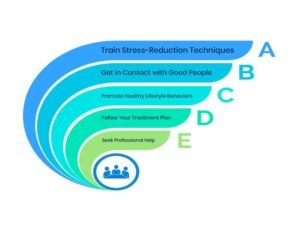Did you ever notice sometimes that your spirits brightened on something good and then dropped to sadness only a moment later? This can be a sign of a condition of atypical depression, a separate subtype of major depressive disorder. Unlike the common type of depression, it brings about a temporary good mood. Still, it is accompanied by its complications of feelings of fatigue, excessive napping and appetite, and extreme sensitivity to rejection.
Similarly, it is not conspicuous in nature and therefore hard to detect, and much of it remains untreated. To heal, one must be aware of the signs that it is and seek help immediately. It is a condition that has the potential to impact daily life and has to be investigated to determine how it influences daily life and discover the proper strategies for managing the condition to re-establish emotional balance and long-term well-being.
What Is Atypical Depression?
Atypical depression is a form of depression that exhibits other symptoms other than those of typical major depression. When something good occurs, people with this condition usually feel better, but very soon the mood falls. They can also take more food, sleep, or have a heavy arm or leg. Furthermore, they are highly sensitive to rejection, which may cause relationship and work-related issues.
In addition, atypical depressive disorder, unlike typical depression, may manifest itself at an earlier age and may take many years without treatment. Management of a mixture of treatment and medication to relieve depression, increase the energy of the patient, and stabilize mood. Therefore, you can seek professional help and discuss your feelings with close people, and it can be significant when it comes to the recovery process.
Atypical Depression Symptoms
The symptoms of atypical depression include the following:
- Find difficulty in getting up.
- Taking more of them may lead to obesity.
- Feeling that the arms or legs are in balance.
- Loss of interest in daily life activities and hobbies.
- Feeling tired or unenergetic the majority of the time.
- Problems with attention or choice making.
Atypical Depression Causes
The causes of atypical depression are as follows:
- Inequalities of brain substances such as serotonin and dopamine.
- Depression or other mood disorders in the family history.
- Work, relationship, or life change stress is seen over a long period.
- Events like abuse or loss of a loved one are traumatic.
- During puberty, pregnancy, or changes in hormones.
- Such long-term illnesses as thyroid issues or diabetes.
- Adverse reactions to some pills.
Atypical Antipsychotics for Depression
The atypical antipsychotics are medications that are sometimes given by physicians to manage depression if conventional antidepressants are not working. The drugs help in the regulation of the brain chemicals like dopamine and serotonin that can affect the mood and reduce depression. They also facilitate anxiety, irritability, and thought management. Furthermore, doctors will be able to use these drugs to supplement the treatment and render it more successful.
Moreover, unconventional antipsychotics may be used in such patients who have extreme depression or persistent symptoms. They can alleviate moodiness and enhance daily operations with due consideration. Nevertheless, side effects such as weight gain, drowsiness, or high blood sugar are highly concerning to physicians. This is one of the reasons why one should not ignore medical advice; they have to see the doctor regularly to guarantee the greatest outcomes of this treatment.
Living with Atypical Depression
Atypical depression may seem like a difficult life to lead, and the incorporation of daily coping and professional intervention may prove to be of unimaginable help. The recovery measures that are being taken include talk therapy, medication, and lifestyle changes for the affected individual.
Moreover, one can come up with simple techniques of dealing with symptoms, as well as developing emotional strength, with the help of simple habits. One such will be daily journaling; you will have time to exercise and write about your mood patterns. To manage the stress and focus on the productive activities, it will also be assisted by a time management and an anti-factory strategy.
- Practices include relaxation like yoga, tai chi, or meditation.
- Stay around the good family and friends rather than being alone.
- You must open up and tell your close friend when you need to tell them.
- You will also want to ask your doctor about your support groups for depression locally.
How to Deal with Atypical Depression?

Seek Professional Help
A mental health practitioner should be sought for diagnosis and treatment accordingly. They can prescribe treatment, drugs, or both as the most effective way to cope with the symptoms. Frequent visits will keep an eye on your progress and make appropriate changes in treatments.
Follow Your Treatment Plan
Adherence to your plan is a way to maintain the mood and minimize sudden mood swings. Never change your treatment without consulting your physician. It will help to be consistent to recover and be stable in the long term.
Promote Healthy Lifestyle Behaviors
Eat healthy food, work out, and sleep well. Working out also releases the natural chemicals that make one feel better and get more energy. Should not consume alcohol or drugs that worsen depression. Even little routines can be sources of sanity and joy.
Get in Contact with Good People
Contact family and friends, support groups when you are feeling low. The ability to express your emotions will help you feel less lonely and more powerful in terms of feeling. Surround yourself with good people, people who are understanding and can comfort and motivate you. A good relationship gives one a safety check when one is in the wrong place.
Train Stress-Reduction Techniques
Remember to incorporate relaxation practices into your routine. This can be meditation, yoga, or deep breathing. These techniques will decrease the stress hormones and help your mind. Routine training makes the task of solving challenges easier.
Atypical Depression Diagnosis
Normal depression is confirmed through a full clinical examination by a mental health professional, who is most of the time a psychiatrist or a psychologist. Your caregiver will inquire about your mood, vitality, sleep, food, and response to positive occurrences because atypical depressive disorder is mood responsive in the sense that an individual feels well after something good has taken place.
Also of interest to them are hallmark features:
- Loss of appetite or gain weight.
- Insomnia: excessive drowsiness or sleepiness.
- Pains of the limbs (leaden paralysis).
- Extremely afraid of rejection or criticism.
- Blood testing to check thyroid and vitamin levels.
Atypical Depression Treatment
Atypical Depression Test
No specific laboratory test can be used to diagnose atypical depression, although professional psychologists rely on screening and assessment instruments. A psychiatrist or psychologist carries out an interview on the mood, sleep, appetite, and emotional response to positive events. Hence, a blood test and physical examination can assist in eliminating thyroid disorders, vitamin deficiency, or other medical conditions that can cause the symptoms of depression.
Atypical Depression Medication
The treatment of atypical depressive disorder and different patients might require the administration of different types of medications, and doctors may administer different forms of treatment to different patients. Specifically, the diet has to be restricted, and Monoamine oxidase inhibitors (MAOIs) have been discovered to be particularly efficient.
Additionally, serotonin-norepinephrine reuptake inhibitors (SNRI) and selective serotonin reuptake inhibitors (SSRI) are prescribed more often because of fewer side effects. Furthermore, other cases might contain the abnormal antidepressants, such as bupropion or mood stabilizers. Dose adjustments are also good, and side effects are minimal as they come under the strict monitoring of a medical practitioner.
Closing Remarks
Atypical depression requires treatment to enhance the quality of life and avoid further deterioration. Books have often advised the combination of medication, psychotherapy, and lifestyle changes that promote healthy lifestyles to treat physical and emotional needs effectively. In the absence of early treatment, atypical depression may cause long-term complications, such as problems in relationships and the high probability of developing other mental conditions.
Likewise, professional help is the best option as it means that the plan is personal, and it focuses on the underlying causes and facilitates a sustainable recovery process. To further find guidance and accurate information on how to think and cope with atypical depression, it is possible to visit the resources of Mental Behavioral, a credible source of information on mental health conditions and methods of treatment.
FAQs
What is the cause of atypical depression?
A combination of genes, biological factors, and environmental causes causes atypical depression. Mood regulation can be impaired in cases of chemical imbalances of the brain, especially those of serotonin, dopamine, and norepinephrine.
What is the difference between typical and atypical depression?
The common symptoms of depression include consistent sadness, lack of interest, fatigue, lack of appetite, and insomnia. Atypical depression is characterized by mood reactivity, transient mood elevation following positive events, and an increase in appetite, weight gain, excessive sleepiness, heaviness of limbs, and hypersensitivity to rejection. Such differences inform the correct diagnosis and primary care.
What are the major symptoms of atypical depression?
Symptoms typically include mood reactivity, appetite or weight gain, excessive sleep, fatigue, and hypersensitivity to rejection.
What is the diagnosis of atypical depression?
A mental health worker examines the symptoms and the medical record and can refer to psychological tests to ascertain the diagnosis.
What are effective treatments for atypical depression?
It is usually cured using antidepressants, psychotherapy, including cognitive behavioral therapy, and lifestyle changes, including regular exercise.
What are the sources of credible information on atypical depression?
Mental Behavioral provides reliable sources and professional advice that you can use to discover and get more information and treatment options.








